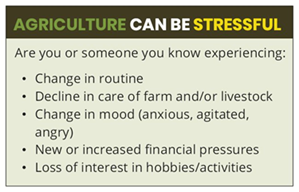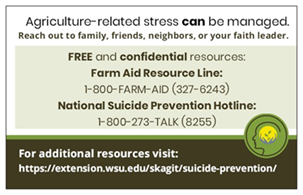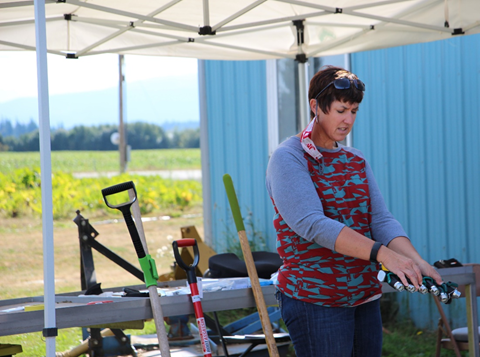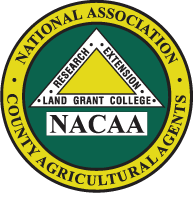Journal of the NACAA
ISSN 2158-9429
Volume 14, Issue 1 - June, 2021
Washington State AgrAbility: Building a New Extension Program During COVID-19
- Mcmoran, D. W., Agriculture And Natural Resources Extension Faculty-Director, Washington State University
VanValkenburg, K., Washington State AgrAbility Coordinator, Washington State University
Seymour, K., WSU Skagit County Extension Grant Coordinator, Washington State University
Bachtel, S., WSU Skagit County Extension Outreach and Marketing Coordinator , Washington State University
Thorstenson, S., WSU Skagit County Extension Agriculture and Natural Resources Program Support Technician, Washington State University
ABSTRACT
The Washington State AgrAbility Project (WSAP) began just prior to the COVID-19 pandemic in 2020. While this life-changing event presented serious challenges to an outreach-based program, WSAP leveraged the Extension platform with its diversity of programs and connections and seized relevant opportunities that arose. Given the increased attention to behavioral health during the pandemic, invitations to share agricultural behavioral health messages and resources provided opportunities for WSAP to tailor community outreach and education on the most relevant topics. We anticipate that WSAP will continue to be resilient and will fully utilize its position and knowledge of holistic agricultural health to further the mission of Extension.
Introduction
The National AgrAbility Project is an umbrella organization including State and Regional AgrAbility Projects (SRAPs) across the US which serve farmers, ranchers, and agricultural workers inhibited by injury, illness, or disability. The AgrAbility program helps ease the return to work and daily living activities and reduce the rate of secondary injury. Extension offices are eligible to apply for USDA funding to implement statewide or regional programs, for more information visit http://www.agrability.org/. The Washington State AgrAbility Project (WSAP) was funded in FY 2019-2020 and quickly immersed in building assistive technology lending library kits and delivering trainings and in-person demonstrations at the Extension office, agricultural health/safety fairs, and conventions. Assistive technology lending libraries offer the consumer a chance to try a piece of equipment prior to purchase, reducing the typically high abandonment rate (as high as 78%) often associated with the adoption of new technology (Petrie et al., 2018). At these events, WSAP was presented alongside the topics of farm stress, agricultural behavioral health, and suicide prevention. With the emergence of COVID-19, in-person outreach was severely limited. Initially, we intended to embed the coexisting Extension farm stress and behavioral health programming into WSAP outreach. However, with an elevated focus on behavioral health and excessive stress brought on by the pandemic, farmers and stakeholders were eager for behavioral health messaging which then opened the door for WSAP to present to more audiences. As demonstrated in American Farm Bureau Federation polls prior to the pandemic, behavioral health and access to services were already issues among farmers and farmworkers in rural areas (Morning Consult, 2019). According to a December 2020 poll, “Farmers and farmworkers were 10% more likely than rural adults as a whole to have experienced feeling nervous, anxious or on edge during the pandemic (65% vs. 55%)” (Morning Consult, 2020). Given the difficulty of developing an outreach-based program under the circumstances of COVID-19, WSAP’s resiliency relied on a diversified and well-connected Extension system and seizing relevant opportunities to collaborate with existing programs facilitated by internal and external stakeholders.
Building a New Extension Program During COVID-19
In addition to the WSAP, Washington State University (WSU) Skagit County Extension also hosts the Washington State Department of Health-funded WSU Agricultural Suicide Prevention Program. Additionally, WSU Skagit County Extension serves as the lead agency in the USDA-NIFA Farm and Ranch Stress Assistance Network (FRSAN) program for the Western Region, and the Western Regional Agricultural Stress Assistance Program (WRASAP). The Extension office’s complementary physical and behavioral health messaging (McMoran et al., 2019) under the umbrella of Total Farmer Health® (concept developed by AgriSafe® Network and used with permission) has extended to partnerships with the Washington Farm Bureau, veterans’ groups, and others. Needs created by the COVID-19 pandemic and invitations to present behavioral health programming have allowed WSAP to participate.
In spring and summer 2020, the Washington Farm Bureau conducted Personal Protective Equipment (PPE) giveaways throughout Washington (Allison, 2020) and invited the WSU Skagit Co. Extension office to participate and share resources and information related to behavioral health in the agriculture industry. WSAP seized the opportunity and, while following COVID-19 protocol, personally distributed jobsite posters and “First-Aid kits” with wallet cards describing agricultural-related stress as well as information on WSAP to over 100 farmers and farmworkers (Figure 1). Spurred by WSAP’s participation in these PPE giveaways, WSAP was invited to participate in the in-person Washington Bulb health outreach fair and provided information on the program to 120 farmworkers. WSAP further addressed holistic farmer health by hosting a series of online suicide prevention trainings (Question, Persuade, Refer for Farmers and Ranchers) to Farm Bureau staff in multiple counties and gave virtual presentations on WSAP and agricultural behavioral health to the WA Farm Bureau Safety/Claims program. Additionally, WSAP participated in various podcasts on the subject of “Total Farmer Health®” including WSU Extension faculty Tip Hudson’s Art of the Range podcast. The WSAP summary of events is presented in Table 1.


Figure 1. Suicide prevention wallet card
Table 1. Summary of WSAP Outreach Events
-4.png)
Although in-person agricultural fairs and conventions were by-and-large non-existent in Washington State during the COVID-19 pandemic, WSAP has hosted multiple webinars for working farmers explaining use of assistive technology for farming-related tasks and daily functioning as well as an outdoor Preventing Injury workshop for new and beginning farmers at Viva, an incubator farm in Skagit Valley. WSAP has also offered several virtual AgrAbility workshops for veterans through the Washington State Department of Veterans Affairs Veterans Support Training Center as part of an on-going collaboration. The veteran community is particularly familiar with concepts of stress, suicide and receptive to related messaging. WSAP is partnering with Growing Veterans, a veterans’ peer support organization which grows food, cultivates community and offers peer support (https://growingveterans.org/). WSAP gave an open-air presentation to veterans at the Growing Veterans farm in Lynden, Washington which addressed agricultural-related stress and distributed first aid kits with relevant materials. Combined with this presentation WSAP staff conducted a field day-style demonstration of assistive technology equipment options while maintaining social distancing requirements. A WSAP lending library patron stated that his “eyes were opened” to many possibilities when he discussed resources and borrowed assistive technology available through the lending library. WSAP features assistive technology for agriculture on its Facebook page through “Thursday toolbox highlights” and featured lending library tools as part of the National AgrAbility Project Virtual Fair WA day which reached 1,823 persons with 120 engagements.

Figure 2. WSAP Assistive Technology Demonstration at Growing Vets farm
WSAP along with five other State and Regional AgrAbility Projects (AK, CA, CO, NM, and UT) and the National AgrAbility Project (NAP) are active partners in WRASAP. WSU Skagit County Extension’s involvement in WRASAP has provided a partnership and platform for WSAP to present to other regional Farm and Ranch Stress Assistance Network (FRSAN) programs as well as NAP. Through the WRASAP collaboration a farm stress behavioral health specialist has been added to the Colorado State University team and will serve the needs of the Western Regional SRAPs.
Conclusions
COVID-19 and associated restrictions on in-person gatherings and outreach forced the newly established Washington State AgrAbility Project (WSAP) to be flexible and adjust plans for outreach. WSAP's resiliency was based on its diversity of programs, strong connections in the agricultural-social service interface, and willingness to seize relevant opportunities which arose. Although we intended to use WSAP as the basis for introducing agricultural behavioral health and suicide prevention programming, the elevated attention given to behavioral health during the pandemic and invitations to share these messages gave WSAP an opportunity to tailor community outreach and education on the most relevant topics. At the time of this writing, the pandemic continues to impact all facets of society including outreach opportunities for program development. We anticipate WSAP will continue to be resilient and use its position and knowledge of Total Farmer Health® to meet the rapidly evolving needs of the community in these unprecedented times and further the WSU Extension mission of “engaging people, organizations, and communities to advance knowledge, economic well-being, and quality of life by fostering inquiry, learning, and the application of research” (Washington State University).
Acknowledgments
Deep thanks go to Curt Johnson, Assistive Technology Specialist with the Washington Assistive Technology Act Program (WATAP) at the University of Washington Center for Technology and Disability Studies for his generosity with hosting workshops, lending time and expertise in guiding the development of the program, and for his affable nature.
Our sincere appreciation is extended to Dr. Robert Fetsch, Dr. Bill Field, and Paul Jones for their kindness, guidance, resources, and longstanding dedication to farmer health and safety.
We also thank Washington State Farm Bureau for their commitment to farmer and farmworker health and safety.
References
Allison, J. (2020, May 29). Farmers pick up safety supplies for workers ahead of harvest. Skagit Valley Herald. Retrieved from https://www.goskagit.com/farmers-pick-up-safety-supplies-for-workers-ahead-of-harvest/article_62b2bef3-0a44-5410-a40e-a2bc30acffb4.html
McMoran, D., Seymour, K., Bachtel, S., & Thorstenson, S. (2019). Creating a Suicide Prevention Program for Farmers and Farmworkers. Journal of Extension, 57(6), Article v57-6iw2. Retrieved from https://tigerprints.clemson.edu/joe/vol57/iss6/11/
Morning Consult. (2019, April 16). “American Farm Bureau Federation Rural Stress Polling Presentation.” [PowerPoint Presentation]. Retrieved from https://www.fb.org/files/AFBF_Rural_Stress_Polling_Presentation_04.16.19.pdf
Morning Consult. (December 2020). “Impacts of COVID-19 on Rural Mental Health.” [PowerPoint Presentation]. Retrieved from https://www.fb.org/files/Impacts_of_COVID-19_on_Rural_Mental_Health_1.6.21.pdf
Petrie, H., Carmien, S., & Lewis, A. (2018, June 26). Assistive Technology Abandonment: Research Realities and Potentials. Retrieved from Springer Link: https://link.springer.com/chapter/10.1007/978-3-319-94274-2_77
Washington State University. WSU Extension. Retrieved from https://extension.wsu.edu/.
